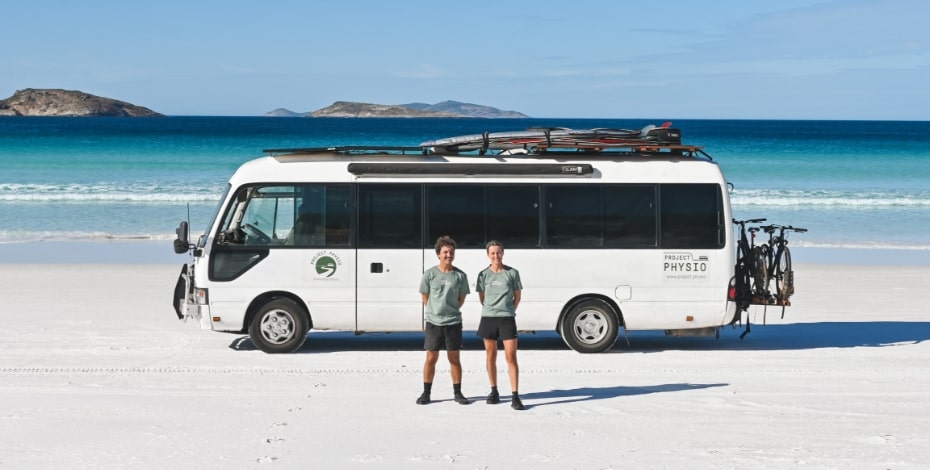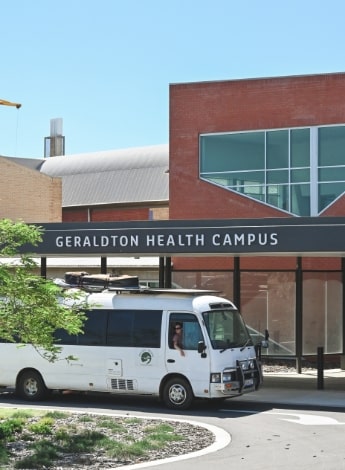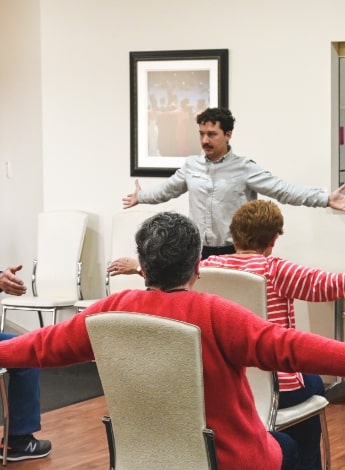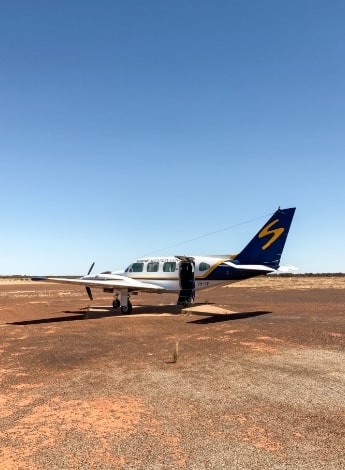
Driving change in rural communities

Packing in your day job and hitting the open road for a life of travel, sunshine and surfing sounds like a dream to many. Clare Austin and David Dimech have taken that one step further and turned their dream into a working holiday and the creation of a successful business model to help clients in rural and remote areas of Australia.
While working as physiotherapists in Wollongong, south of Sydney, Clare Austin APAM and David Dimech APAM would often chat about their shared dream of travelling across Australia.
The talk of travel evolved into an idea to buy a van and do it up to drive around the country.
But it was when their conversations turned to combining the driving holiday with their passion for delivering physiotherapy to rural and remote communities that they really struck gold.
In 2019, the pair set the wheels in motion for their working holiday.
They had spent the past year refining their dream while working in a variety of physiotherapy roles in Wollongong, and began saving in earnest to purchase the van.
The idea for the van eventually grew into buying a bus and, in late-2019, a 2007 Toyota Coaster, previously used as a community bus in Dubbo, caught their eye.
Clare and David then spent every weekend for the next year converting the bus into a motorhome.
By October 2020, they were ready to hit the open road.
‘It took us about a year to deck out the bus, but over that time we started brainstorming ideas about how we could work as physios as well, while we were travelling and taking up locum roles,’ Clare says.
‘Then we decided that we wanted to start our own business and see how that would go on the road.’
That seed of an idea soon turned into action—and Project Physio (@project.physio) was born.
At the heart of the business was a drive to improve the accessibility of healthcare around the country.
The business plan centred on providing physiotherapy to facilities in rural and remote areas, including hospitals, residential aged care facilities and community centres.
The mobile practice, they decided, should offer physiotherapy to individual clients in their own homes as well as those out in the community.

Clare and David spent two months working at Geraldton Regional Hospital on their tour around the country.
‘Looking back, we really didn’t have any idea of how it would work.
'It has just evolved as we’ve explored different places and found gaps in areas of physio and different demands in services in many vastly different communities,’ Clare says.
‘And it’s continued to evolve as we’ve gone along.’
David says that when they set off from Wollongong in 2020, the plan was to enjoy a few months off.
They travelled up the east coast to Queensland’s Sunshine Coast, then back down to Victoria for Christmas, before starting their first locum roles on the Fleurieu Peninsula in South Australia.
This gave them their first taste of working as locums and exposed them to the limited allied health workforce in rural and regional areas and to what that means for local communities.
By a very fortunate happenstance, the pair has avoided COVID-19 lockdowns in every state they’ve been in since.
‘We weren’t really aware of the gaps in rural health, specifically with allied health, until we were going out to these rural areas and we found that they were crying out for allied health professionals,’ David says.
‘So it became a case of us going into new areas and identifying the gaps in particular communities and then targeting those gaps through our skills in physiotherapy.’
Travelling through the eastern states, before eventually traversing the country to Western Australia, where InMotion caught up with them in Esperance, 700 kilometres south-east of Perth, Clare says she and David usually predetermined each location along the way and would stay at each destination for work for about two months.
They would source locum work ahead of the next location via the use of technology and networking, while also spending time as tourists and holiday-makers.
Arriving in a new location, sometimes with part-time locum work already lined up, Clare and David made a point of contacting physiotherapy practices, hospital departments, medical centres and aged care facilities to work with them and therefore avoid doubling up on services or stepping on anyone’s toes.

David Dimech presenting on behalf of Parkinson’s SA with a group of clients.
At times, they would rent rooms in a medical practice and network with local GPs with the aim of complementing the town or area’s existing physiotherapy provision.
Locum work in hospitals and established practices provided ready access to equipment and gym facilities.
‘We’ve realised that when we are coming to these rural areas, community physio works really well because it allows us to use infrastructure in the environment such as gyms, hydro or the client’s home and to show them how they can be completing their rehab or their exercises in their own environment so that when we do leave, they can continue independently,’ David says.
Physiotherapy provision varies greatly depending on the location, Clare says.
She and David have witnessed the impact on rural and remote communities of shortages of allied health specialists, particularly in paediatrics, disability, and in services for older adults in the home.
They have also worked in aged care facilities and have experienced the shortage of allied health workers able to treat clients.
The COVID-19 pandemic also continues to have an impact on healthcare workforce provision across the country, they say.
‘For example, where we are right now in Esperance, Western Australia, there’s a few local physios, a clinic, and there’s the public hospital, which usually services the community.
'But because of COVID-19 they’re not doing that at the moment, which means there is a gap in that service in the community,’ Clare says.
‘We’ve been here for about a month and it looks like we’ll be staying for a few more weeks, to be honest.
'There’s a real need for us here.’
Admitting that the work often takes them outside their comfort zone, David says they employ a lot of flexible thinking to problem-solve while out on the road.
So far they have worked with communities on the Yorke Peninsula, just west of Adelaide, Karratha, in Western Australia’s Pilbara region, as well as Geraldton in the Midwest.
They’ve also travelled up the middle of the country from South Australia and over to Broome in Western Australia.

One of the small planes the Project Physio team caught to travel to remote communities.
‘They’re often one-of-a-kind experiences and you really have to think laterally about the ways that you’re treating and seeing people based on your environment and the availability of other services in those areas.
'So yeah, we’ve definitely come across challenges working rurally, such as not having access to things like scans or not being able to refer on to other health practitioners or get specialist reviews, those sorts of things,’ David says.
Through Project Physio, the pair has worked with Western Australia’s Integrated Chronic Disease Care program, a multidisciplinary program in rural areas for people who can’t easily access healthcare.
As part of that work, they hopped on a small plane with a podiatrist and a dietitian and landed in a very remote community to work with the local population there.
‘Sometimes you go to these places and there’s not even a clinic room, or you’re all bunched in together in one room with other allied health practitioners and you’re having to talk to a patient, to educate them and perform your own part of their treatment, with the other healthcare workers right there.
'We’re all trying to work on the patient together, so that’s been a bit challenging.
'But it works well in the end,’ David says.
The pair has also been working to ensure that when they leave a town or community, they are not leaving their clients without access to services.
‘Over the past 18 months that we’ve been doing this, we’ve been trying to make our service a bit more sustainable so that once we leave, we’re not leaving places without services.
'We’re working on a way to help with that issue once we move on,’ Clare says.
Of their experience on the road in rural and remote communities so far, both Clare and David say it has been an incredibly eye-opening and challenging time—in a good way.
Each has experienced personal and professional growth beyond measure and they would encourage any other physiotherapists thinking of doing the same to get out and give it a go.
‘It’s been very rewarding and there have been a lot of great career experiences that we’ve gained from it,’ Clare says.
‘And the people we have met along the way have been amazing.’
You can find Project Physio on Instagram at @project.physio.
Main image: The Project Physio team enjoy sun and surf on their travels around Australia.
© Copyright 2025 by Australian Physiotherapy Association. All rights reserved.





